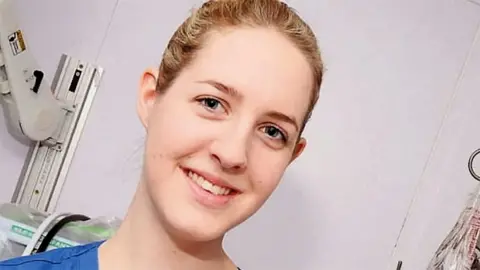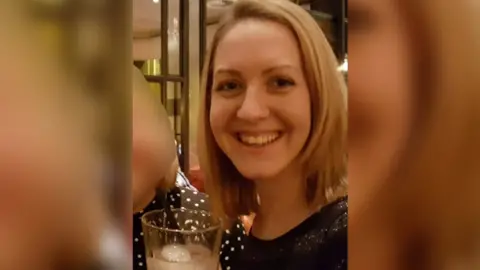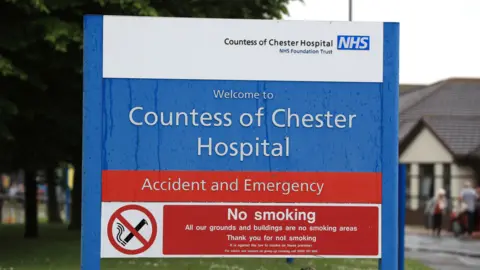Lucy Letby: Baby's death was unexpected, nurse's trial hears
 SWNS
SWNSA doctor has described the "traumatic" night a baby allegedly murdered by Lucy Letby "suddenly deteriorated".
Ms Letby has been accused of killing seven babies and attempting to murder 10 others at Countess of Chester Hospital in 2015 and 2016.
The 32-year-old denies 22 charges.
It is alleged she fatally injected an excess amount of air into the bloodstream of one baby before attempting to murder his sister in the same way.
Paediatric registrar Dr David Harkness, was on duty on the evening the first baby, referred to as Child A died, in June 2015.
He told the trial at Manchester Crown Court it was "very unexpected".
The jury heard how medics battled to save Child A after his heart rate dropped to 60-70 beats per minute.

Dr Harkness said chest compressions were begun and fluids, including adrenaline, were administered. CPR continued until 20:57, but at that point no heart rate was present.
"It was felt the kindest thing to do was to stop resuscitation," he said.
Reflecting on the events of that night, he said: "This was a completely stable, well baby, who had no reason to suddenly deteriorate, so I was very surprised to be called back.
"He had very unusual patching of his skin, which I have never seen before.
"The patches were blue, purple, red and white. I've never seen it before or since. It didn't come and go - it came and then he went into cardiac arrest."
Dr Harkness said the "abnormal" patches were "all over" Child A's body and he had only ever seen it in one other child.
 PA Media
PA MediaMs Letby's defence lawyer, Ben Myers KC, later questioned the veracity of that account.
Mr Myers took the jury through Dr Harkness' medical notes at the time, which made no reference to "blue, purple, red and white" patches.
Pressed on why this had been omitted, Dr Harkness said it was an "emotional" time, as it was one of the first neonatal deaths he had experienced and he had found it "greatly upsetting".
The jury earlier heard Child A could not be given fluids for at least four hours between 16:00 and 20:00 on the day he died after difficulty fitting a umbilical venous catheter (UVC).
A UVC allows fluids and medicines to be given without frequently replacing an intravenous line.
A note shown to the court from nurse Melanie Taylor, who was on duty on the day Child A died, stated: "UVC in wrong position, reinserted. Again in wrong position. Cannula tissued. Doctors busy on ward. Aware no fluids running for a couple of hours."
Ms Letby's defence barrister Ben Myers KC asked Ms Taylor: "He should have been getting fluids during this four-hour period, shouldn't he?"
Ms Taylor responded: "Yes."
The nurse, originally from Hereford, denies all the offences, which are said to have been committed between June 2015 and June 2016.
The trial continues.

Why not follow BBC North West on Facebook, Twitter and Instagram? You can also send story ideas to [email protected]
